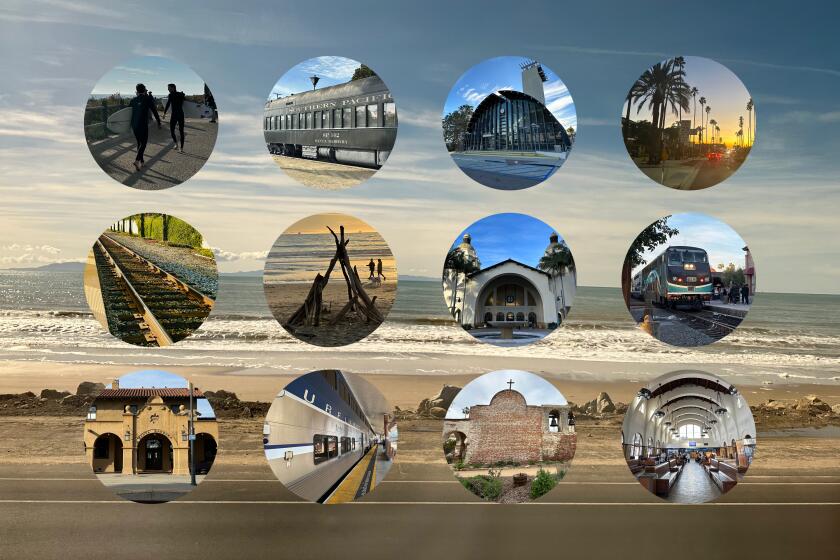Tourism Moving Slowly in Former Soviet Union : Eastern Europe: With many tourist services still in disarray, travelers should be prepared for some hassles. Advance planning is essential.
The long, painful era of the two Europes is over. The few remaining barriers between East and West are falling fast, and the entire Continent is more open to travelers now than it has been for decades.
In the East, the nations of the old Soviet bloc are scrambling to increase and improve tourist services, and many new and unusual tours are being offered. Even Russia, Ukraine and other republics of the Commonwealth of Independent States are actively courting Americans, despite domestic food shortages and continuing ethnic strife in some limited regions. Once-forbidden zones, long barred to foreigners under the Communist regime, have been opened to tours.
But are Russia and other republics of the former Soviet Union viable vacation destinations? “It’s a good question,” says Marylou Foley, president of Tour Designs, a Washington, D.C., travel firm that organizes individual and group trips to Eastern Europe. And her answer, with a few reservations, is “yes.” She travels there monthly and, indeed, recently returned from a trip to Moscow, St. Petersburg and Kiev.
The dismantling of the Soviet empire has left some tourism services in disarray, she says, and uptight travelers will not have as rewarding a visit as those who can roll with the occasional hassle thrown their way. Advance planning is essential, since foreigners in Russia still cannot book a room, a flight or a train on the spur of the moment.
And the big cities can be expensive. A hotel room in Moscow ranges from about $150 a night at a large, out-of-the-way hotel to $420 a night at the centrally located and recently renovated Metropole. A hotel buffet breakfast can cost $15 to $25 per person. Tour packages often are cheaper, but you should be aware of the quality of accommodations being provided and the location.
As recently as two weeks ago, the U.S. State Department issued a travel warning that advised U.S. citizens planning to visit any of several of the former Soviet republics, including Russia, Ukraine, Kyrgyzstan, Tajikistan and Uzbekistan, to avoid demonstrations or other signs of political unrest due to the unsettled conditins, and to take precautions against theft. The strongest words were reserved for the republics of Russia and Ukraine, where crimes against tourists--primarily robberies, muggings and pick-pocketing--are considered a growing problem. Travelers were advised to exercise the same caution--”even in social encounters”--that they would in the United States. In addition, U.S. citizens in frail health were advised not to visit the areas due to severe shortages of basic medical supplies, including disposable needles, anesthetics and antibiotics.
Ethnic turmoil has been reported in Georgia, Armenia and Azerbaijan. Travelers planning a trip to those destinations should keep abreast of developments through news reports and by calling the U.S. State Department’s Citizens Emergency Center for current advisories: (202) 647-5225.
As for transportation, Foley flew Aeroflot, the domestic airline, between cities, and contrary to some reports of 24-hour delays, she experienced delays of only two to three hours on each flight. The carrier continues to be plagued by a shortage of fuel, she says, and planes sometimes have to take indirect routes to land and fill up at airports with extra fuel.
From St. Petersburg, she took the overnight train to Helsinki, the Finnish capital. And, sad to say, the conductor did not serve tea, a tradition on the old Soviet trains. Foley was advised to hide valuables because sleeping passengers have been the victims of recent thefts.
In her experience, the shortage of food in Russia and elsewhere is not a problem for most foreign visitors. The hotels fly in supplies from the West, she says, but of course the expense is reflected in the cost of meals. The so-called co-op restaurants of Moscow, private enterprises that tend to be run by immigrants from non-Russian republics, also are able to buy food from local markets, passing the costs along to their customers. The co-ops generally serve ethnic dishes, charging $12 to $15 per person for a dinner.
Restaurant service, often poor during the Soviet years, remains slack in state-run establishments, Foley says. But she has found that patrons get a friendlier welcome and more efficient service in the co-ops and joint-venture restaurants operated in partnership with foreign investors. Some restaurants seat diners according to whether they are paying in rubles or a hard (foreign) currency. Service usually is faster at hard-currency tables.
Foley advises travelers bound for the republics to carry plenty of U.S. dollars in cash, and much of it should be in small-denomination bills--$1, $5 and $10--that are accepted widely. There is currently a shortage of rubles because of the increased domestic prices for goods and because the governments are not printing rubles to stem inflation. Thus, a traveler wanting to cash a large foreign-currency traveler’s check may not be able to do so. According to the U.S. Embassy in Kiev, for example, Ukraine will not accept any traveler’s checks or credit cards.
Visas are required for all republics of the former Soviet Union and are issued by the Russian consulate through a travel agent. The three Baltic nations--Estonia, Latvia and Lithuania--are issuing their own visas, and there was a recent report from the State Department that Ukraine has also begun to issue separate visas.
According to the Russian consulate in New York, a seven-day visa for travel within Ukrainian borders can be obtained at the airport in Kiev on arrival. The price is $50. It remained unclear whether a visa can be obtained at the border if a traveler is entering by auto or train. The Baltic nations will issue visas to travelers entering by plane or boat on arrival. Those entering by car or train should obtain visas in advance.
Elsewhere in Eastern Europe, visas now are necessary only for Albania and Romania. A Romanian visa can be obtained at the border. An Albanian visa must be obtained in advance, most conveniently with the help of a travel agent.
Although Poland, Czechoslovakia, Hungary, Romania and Bulgaria have rushed to open new hotels and renovate old ones, there still aren’t always enough rooms to meet peak season demands, so reservations are advised. Last year, an estimated 600,000 Americans visited Eastern Europe.
One new disappointment, says Foley, is that some Eastern European establishments have become “callous” in their eagerness to get U.S. dollars and other hard currencies, charging excessive rates although service may be inefficient or inexperienced.
Travel to Albania, which only recently opened its doors to Americans, should probably be considered only by the adventurous. The political situation is still unsettled, and food riots have erupted because of shortages. Nevertheless, the Kutrubes Travel Agency of Boston has scheduled a series of 10-day escorted motor-coach tours departing from mid-April to the end of October.
Foreign visitors are not subject to food shortages, says owner Kathy Kutrubes, but meals are far from gourmet. A typical dinner includes pasta with cheese, a salad and a small steak with French fries and assorted vegetables. Hotels are modest but adequate. The real appeals of Albania are its mountainous beauty and the opportunity to witness the nation’s 3.3 million inhabitants emerging from under one of the most repressive Communist governments. Few changes occurred in the decades after World War II.
Most of Kutrubes’ clients, she says, are world travelers who want to see a country that has been off-limits to them until now. Some reach out to befriend Albanians: One man donated a map of the United States to a geography student whose school did not possess one.
The tours depart Boston for Albania via Zurich on Swissair. The price ranges from $1,985 to $2,295 per person, double, based on departure date. It includes air fare, hotels with private bath and all meals. A one-week add-on package to Greece is available. For information: Kutrubes Travel Agency, 328 Tremont St., Boston, Mass. 02116, (800) 878-8566 and (617) 426-5668. For individual travel, consult Kutrubes or another travel agent. The Albanian mission at the United Nations (see below) can provide the names and phone numbers of Albanian specialists. Currently, most independent travel is booked at a rate of $170 to $180 a day per person, which includes private car, driver, lodging and meals.
The Elbe River, once part of the historic border that separated East and West Germany, can now be explored aboard a first-class riverboat operated by KD River Cruises of Europe. The firm has been offering Rhine River cruises for 166 years. The first Elbe cruises were introduced last summer, but three new itineraries that include Czechoslovakia have been created for this year.
The cruises, lasting from four to seven nights, are available from April into October. A seven-night cruise that includes visits to Berlin and Prague ranges in price from $1,115 to $1,645 per person, double, depending on cabin class and departure date. For information: Rhine Cruise Agency, 170 Hamilton Ave., White Plains, N.Y. 10601, (800) 346-6525 and (914) 948-3600.
A press release from Intourist, the official tourism organization for the old Soviet Union, advises that it is still very much in business and is offering more than 800 tour itineraries to Russia and 14 other republics. Almost 96% of the former country is now open to visitors, says Intourist deputy director Alexey Mesiatev, and several new tours explore regions formerly off-limits.
One new tour focuses on Minsk, a city of 1.4 million residents that was devastated during World War II and had to be rebuilt. Although the city is new, its soul clings to the past, and Minsk is a center for folk music and dance. Another tour features Dnepropetrovsk, a city of 2 million on the banks of the Dnieper River in southeastern Ukraine. Also noted for its folk arts, it has only recently been opened to foreign visitors.
All Intourist tours must be booked through a travel agency, which can provide information on departure dates and costs. Travelers can call Intourist at (212) 757-3884.
Global Volunteers, a group offering international aid on a personal level, is looking for volunteers for projects this year in two Russian towns, Tver and Gzhel’, both about three hours outside Moscow. Needed are participants who can instruct individual Russians on business practices, the English language, problem-solving techniques, home gardening and home construction.
Teams of 10 to 20 volunteers will be dispatched to the communities for three weeks. The first trip is scheduled for May 22 to June 13, and there will be one trip a month from June to October. The all-inclusive cost is about $3,000 per person, which is tax deductible, according to the organization. Interpreters will be available. For more information: Global Volunteers, 375 E. Little Canada Road, St. Paul, Minn. 55117, (800) 487-1074.
A helpful guide for travel to the Commonwealth of Independent States is the State Department’s “Tips for Travelers to the U.S.S.R.,” available for $1 from the Superintendent of Documents, U.S. Government Printing Office, Washington, D.C. 20402.
Sign up for The Wild
We’ll help you find the best places to hike, bike and run, as well as the perfect silent spots for meditation and yoga.
You may occasionally receive promotional content from the Los Angeles Times.



